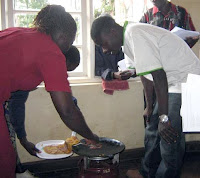
Our simple technique for making charcoal Earth Orbs saves trees, creates income sources for villagers and recycles "garbage" into a valuable product. Through our training we expect to model the positive effects of organizing and empowering our communities.
Would you please endorse my idea here: http://arc.peacecorpsconnect.org/view/977
If we manage to get enough votes, we will be awarded the money to carry out our project. Thanks, and please tell your friends!









.jpg)




.jpg)

.jpg)











+is+used+in+making+the+liquid+manure(folier+sprayer).jpg)




















